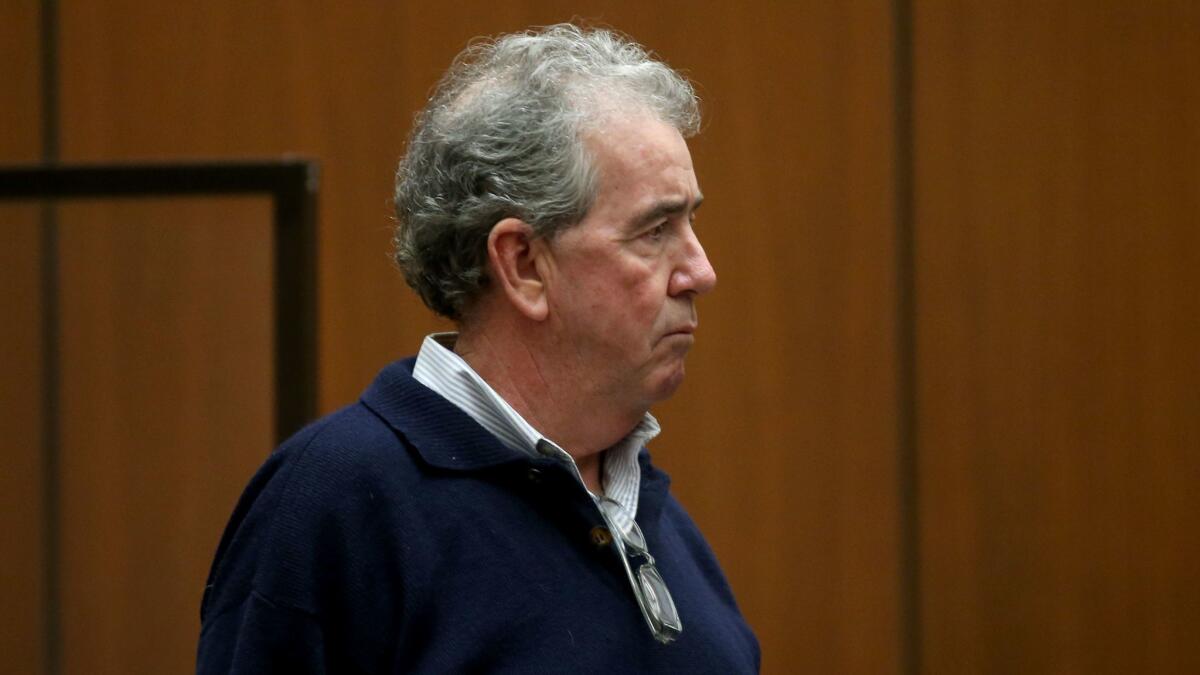Former L.A. Coliseum executive at the center of corruption scandal sentenced to 3 years of probation

- Share via
A former general manager of the Los Angeles Memorial Coliseum was formally sentenced Wednesday to three years of probation for his role at the center of a corruption scandal.
Patrick Lynch’s prison-free sentence — described by some as surprisingly lenient — marks the end of his long legal saga stemming from allegations that he accepted hundreds of thousands in bribes from a stadium contractor as part of the kickback scheme.
Days after his 2012 arrest on multiple corruption charges, Lynch struck a deal with the Los Angeles County district attorney’s office. He pleaded guilty to a count of felony conflict of interest — avoiding a trial and the possibility of a long prison sentence.
He was not sentenced until Wednesday, however, because his hearing was contingent upon resolutions in the other defendants’ cases.
As part of the agreement, Lynch — who once fraternized with NFL owners and socialized with power brokers — was ordered to pay $385,000 to public coffers. That was the amount prosecutors say he got in kickbacks from a former stadium janitorial contractor, Tony Estrada, who is a fugitive.
The case grew out of Times reports on fiscal anomalies at the Coliseum and companion Sports Arena, which Lynch managed for 17 years before abruptly resigning under pressure. Lynch’s attorney, Carl Capozzola, said that as part of the plea there was an understanding that his client was available to testify against other defendants. That never happened, however, because none went to trial.
At the time of his plea, some legal experts were surprised that the district attorney’s office didn’t demand jail time, noting that Lynch was originally indicted on 10 felony counts. Prosecutors say that for his part in the scheme, Lynch got regular chunks of money from Estrada. The installments — which were often funneled through a Miami bank account — stretched over more than four years, prosecutors said.
During Wednesday’s hearing, Capozzola said he never would have advised his client to take the plea if he’d known it would take almost five years before he was sentenced.
The defense attorney asked Los Angeles County Superior Court Judge Kathleen Kennedy to reduce the conflict of interest count from a felony to a misdemeanor.
“This man, who has never done one other thing wrong, cannot get a job,” Capozzola said. “He’s got this felony that’s dragging him and his family down.”
Capozzola also read the judge part of an email he said he’d gotten recently from L.A. County Inspector General Max Huntsman, a former deputy district attorney who was the original prosecutor on the case.
Huntsman wrote that he never expected it to take so long for Lynch to reach sentencing and that he thought it was appropriate to have the charge dropped to a misdemeanor.
Kennedy ruled that Lynch, who has already paid his restitution, could come back in a year and ask to have the charge reduced. She also sentenced him to 14 days in jail — a largely procedural matter as he has already served a week behind bars and gotten credit for another.
Asked by the judge if he understood the terms, Lynch, who leaned against a chair throughout the hearing, responded in a whisper: “Yes.”
Prosecutors also charged the Coliseum’s former events manager, Todd DeStefano, who was accused of receiving nearly $2 million in bribes — money siphoned from taxpayers, who own the stadium. The money ended up either in DeStefano’s pockets or in his side company with a trickily similar name: Los Angeles Coliseum Events.
Prosecutors alleged that the biggest chunk of the stolen money — $1.89 million — came from two companies, including one run by a nationally recognized leader in electronic dance music circles, Insomniac founder Pasquale Rotella. Rotella and another concert promoter, Reza Gerami, were also charged.
The corruption prosecution has been marred by missteps.
In 2015, the district attorney’s office had to start trial preparations from scratch after removing the lead prosecutor on the case for mishandling evidence.
A year later, the judge rebuked the new prosecutors for bungling the handling of evidence in the case.
“You guys are just tripping over your feet and falling on your faces,” Kennedy told prosecutors in the district attorney’s public integrity division.
As a result, Rotella and Gerami were allowed to plead no contest last year to misdemeanor counts in deals that guaranteed they didn’t spend a single day behind bars.
Meanwhile, DeStefano pleaded no contest to one felony count. He was sentenced to six months in county jail and ordered to pay $500,000 in restitution. He left jail shortly before Christmas, having served only three months behind bars, according to online jail records.
A sixth defendant, former Coliseum technology manager Leopold Caudillo Jr., is accused of directing stadium business to a company in which he had a financial stake. He has pleaded not guilty to a conflict of interest charge.
Times staff writers Rong-Gong Lin II and Paul Pringle contributed to this report.
For more news from the Los Angeles County courts, follow me on Twitter: @marisagerber
ALSO
The Coliseum case is the latest embarrassment for D.A.’s corruption unit
L.A. education foundation became a lucrative source of income for USC’s Pat Haden and his relatives
Can L.A.’s aging Grand Dame, Memorial Coliseum, take center stage one more time?
More to Read
Sign up for Essential California
The most important California stories and recommendations in your inbox every morning.
You may occasionally receive promotional content from the Los Angeles Times.














